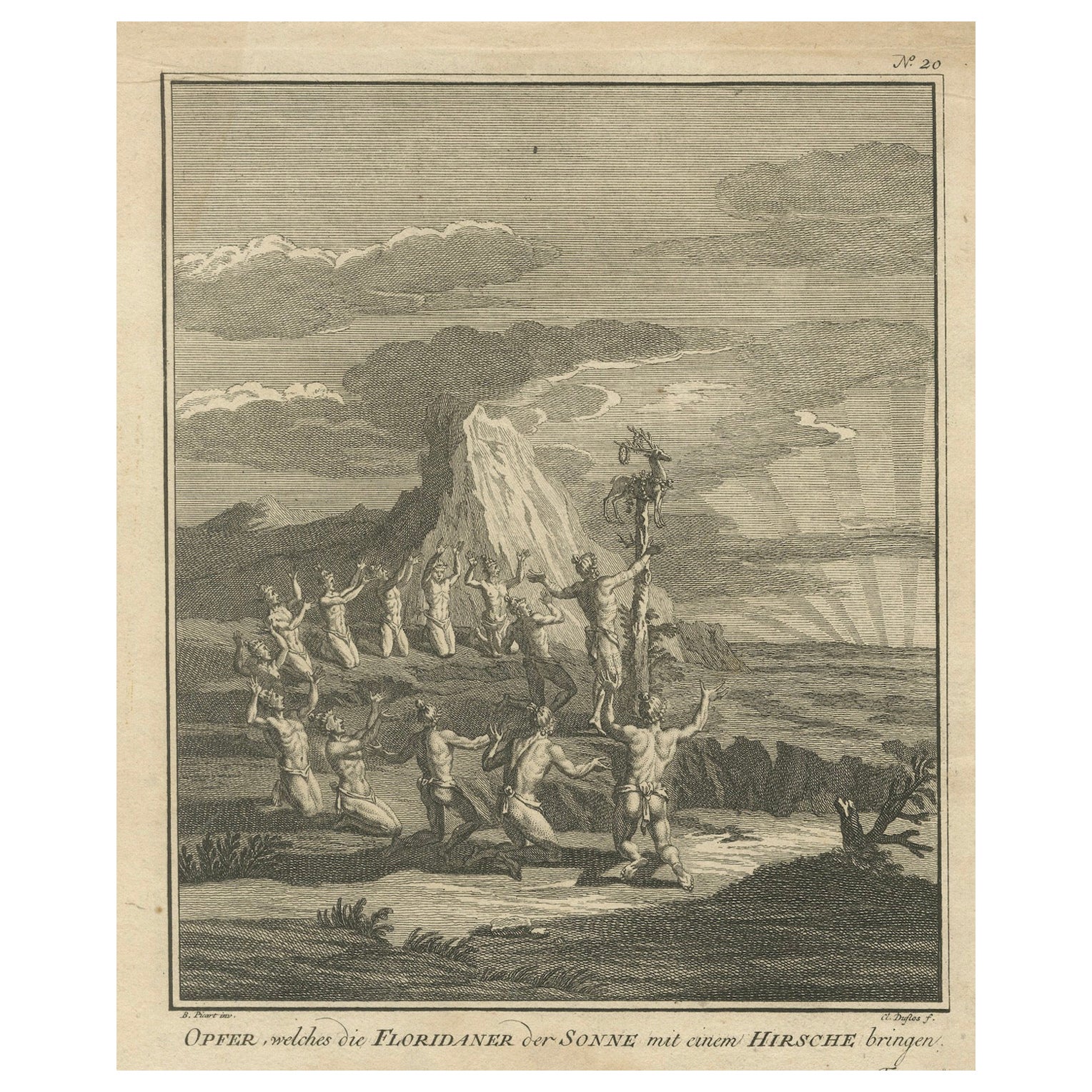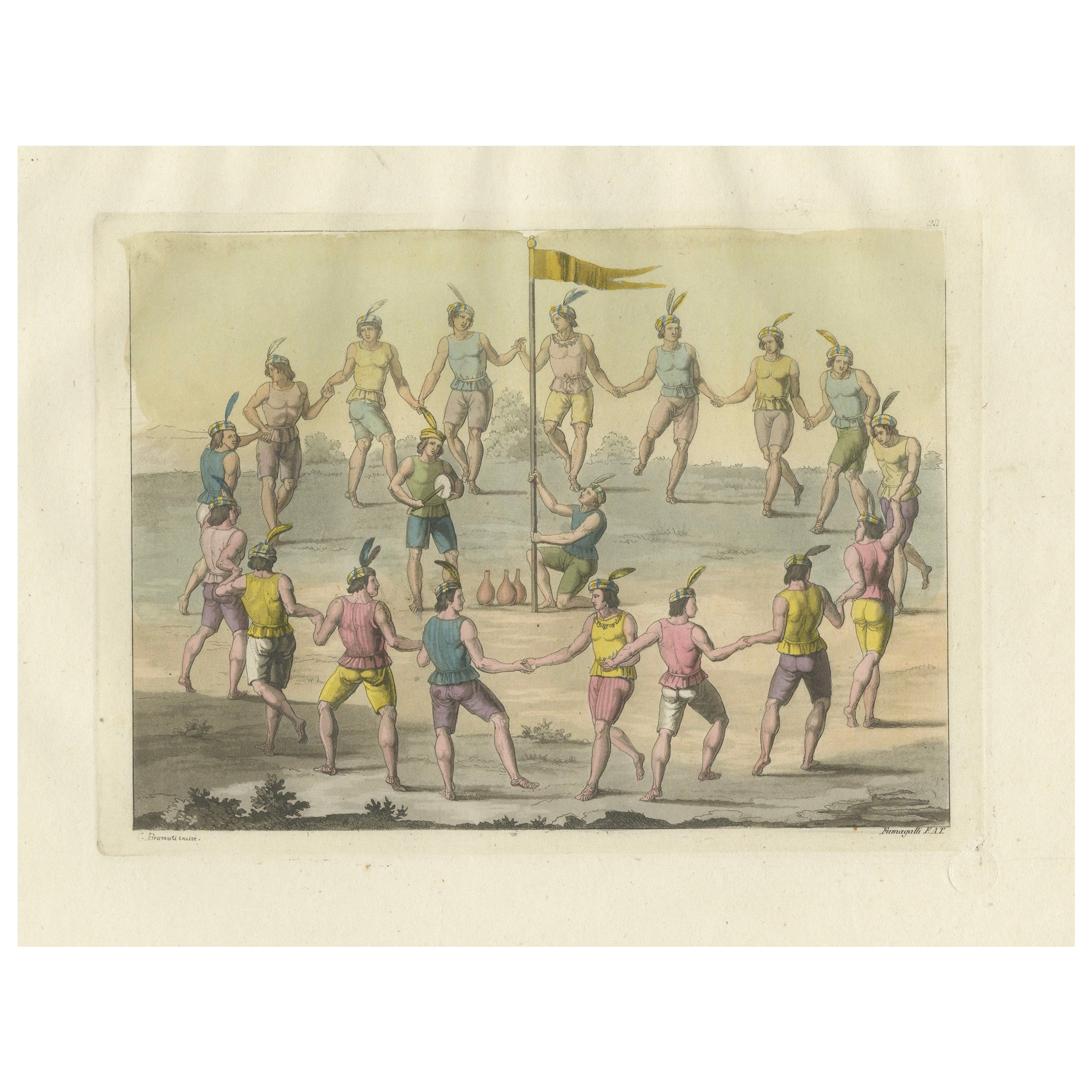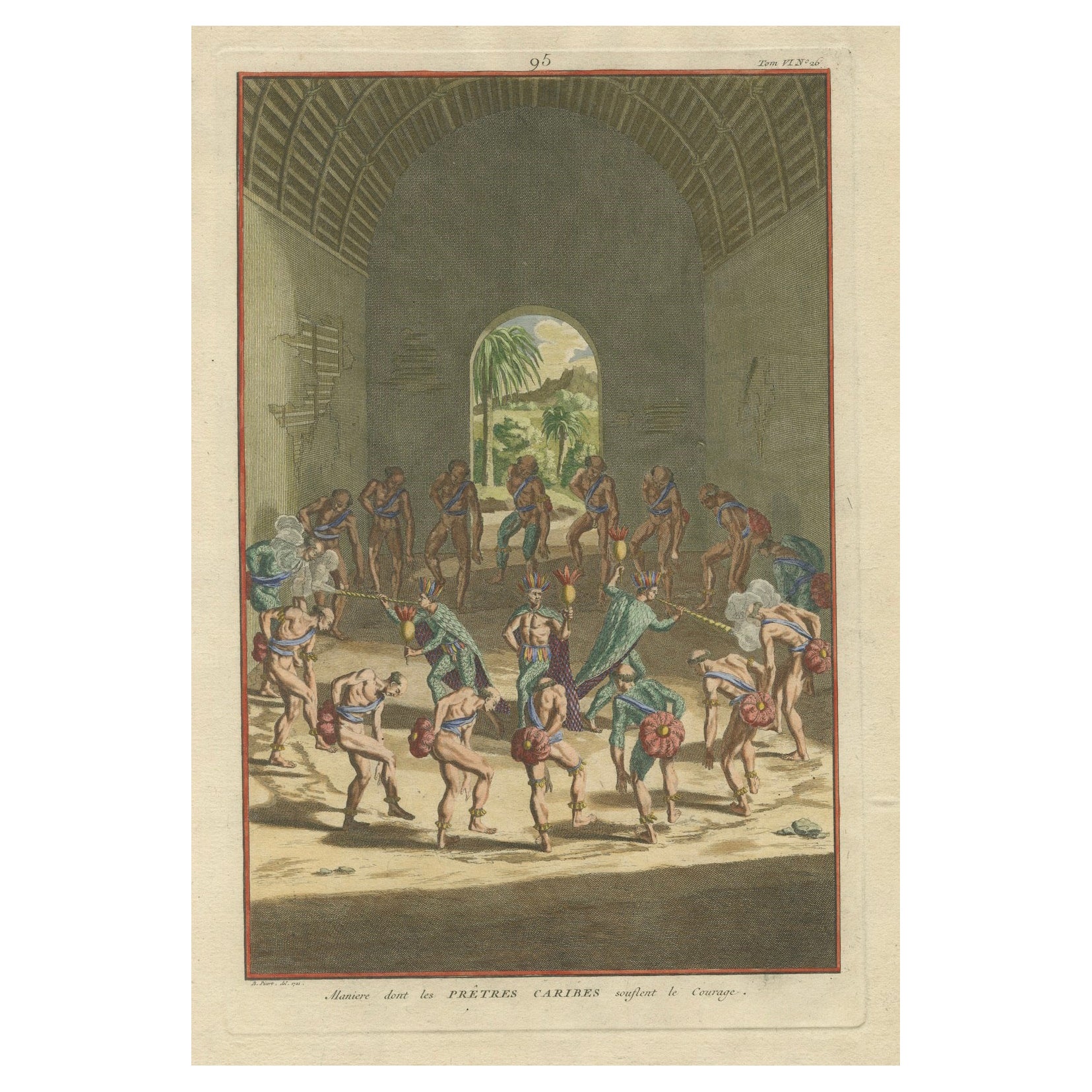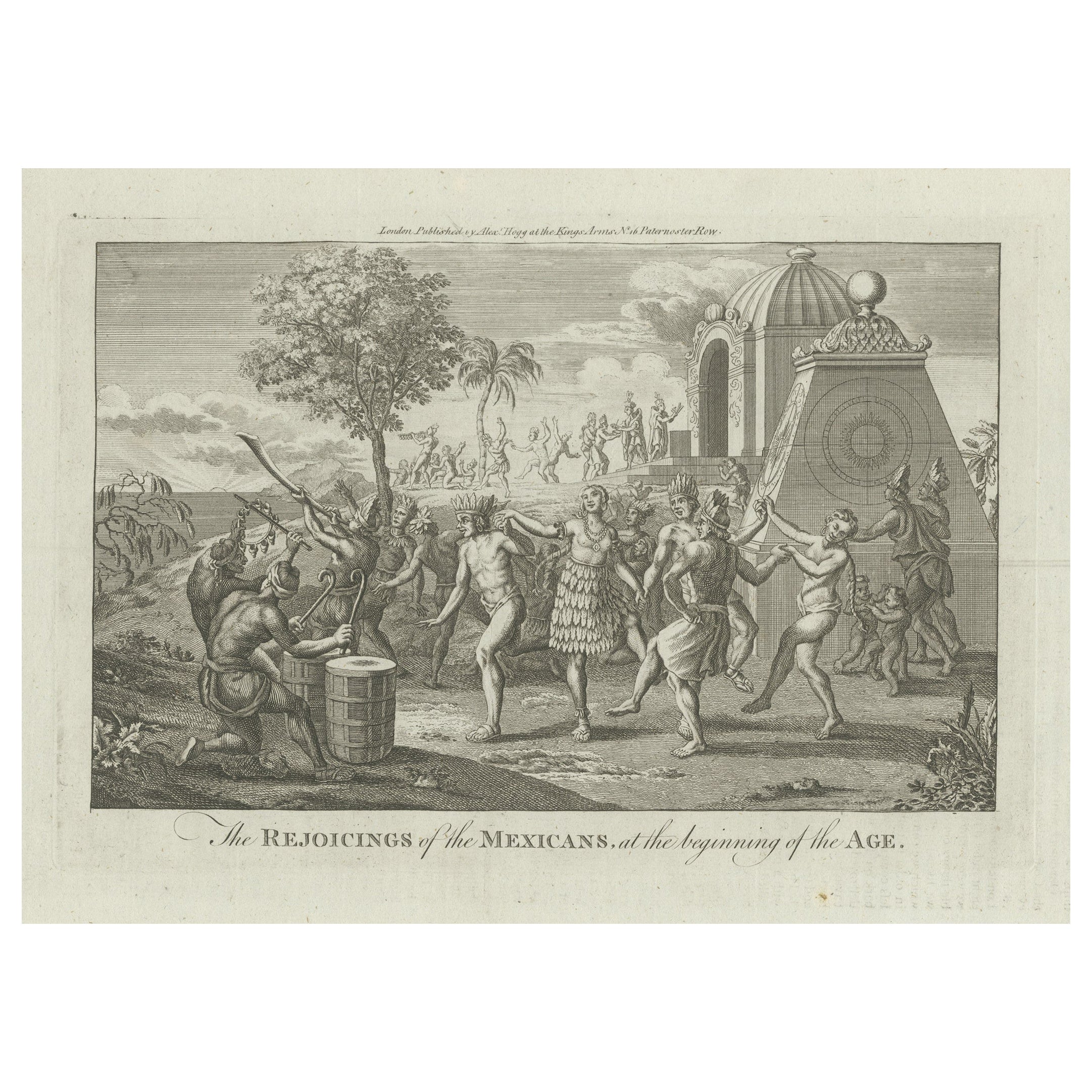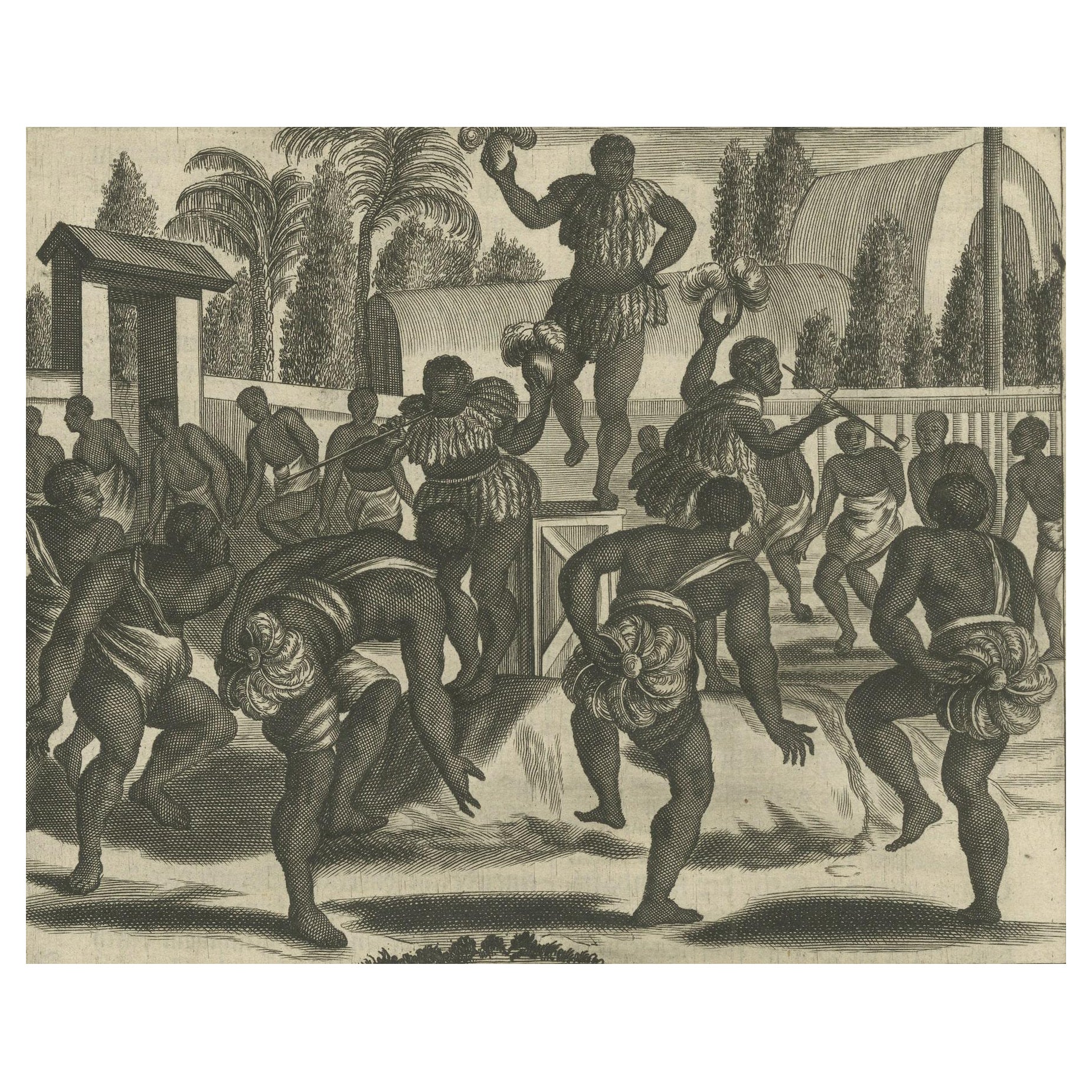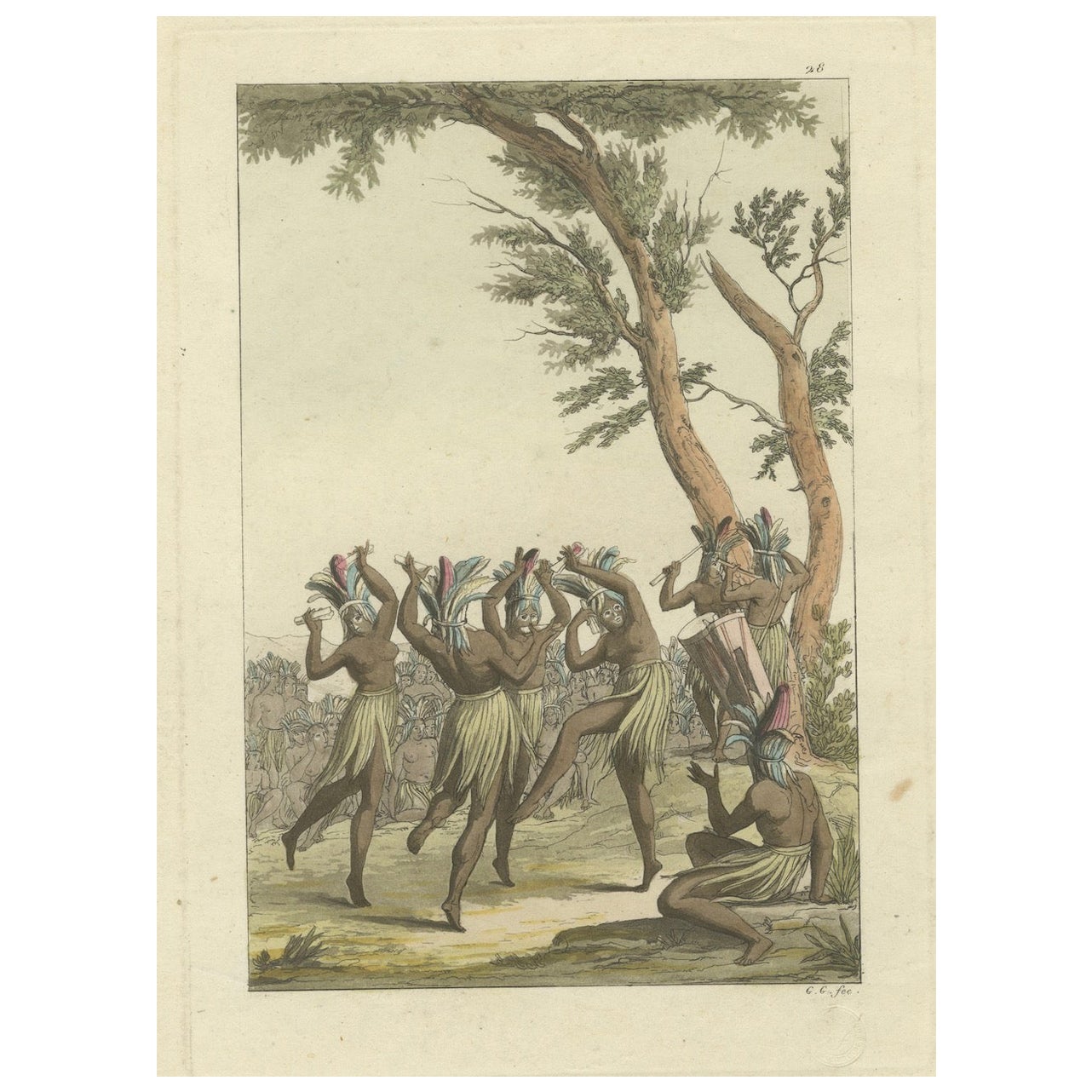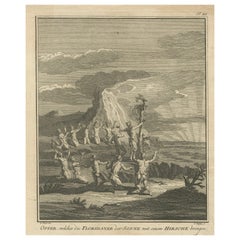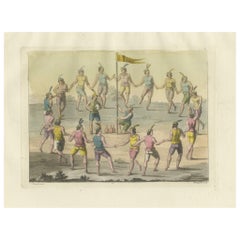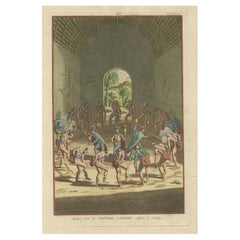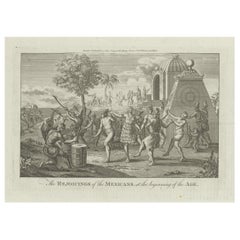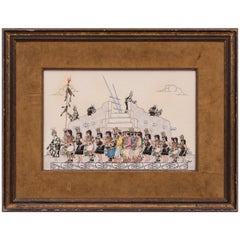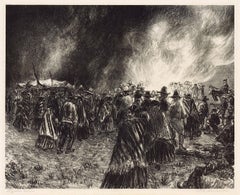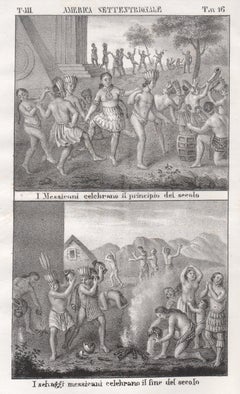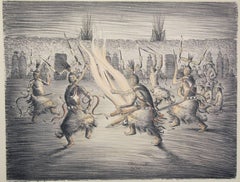Items Similar to Native Americans dancing, offering to the Great Spirit, Gitche Manitou
Want more images or videos?
Request additional images or videos from the seller
1 of 6
Native Americans dancing, offering to the Great Spirit, Gitche Manitou
$219.50
$274.3720% Off
£162.28
£202.8520% Off
€184
€23020% Off
CA$301.91
CA$377.3920% Off
A$335.60
A$419.4920% Off
CHF 175.91
CHF 219.8920% Off
MX$4,098.43
MX$5,123.0320% Off
NOK 2,196.16
NOK 2,745.2020% Off
SEK 2,066.17
SEK 2,582.7220% Off
DKK 1,400.79
DKK 1,750.9920% Off
About the Item
Description: Antique print titled 'Le grand sacrifice des Canadiens à Quitchi-Manitou ou le grand esprit'. This plate shows an ethnic scene of Native Americans dancing around a bonfire, offering to the Great Spirit, Gitche Manitou.
This print originates from 'Ceremonies et costumes Religieuses (..)'.
Artists and Engravers: Bernard Picart (1673-1733), a French painter and engraver.
- Dimensions:Height: 13.78 in (35 cm)Width: 9.06 in (23 cm)Depth: 0 in (0.02 mm)
- Materials and Techniques:Paper,Engraved
- Period:1720-1729
- Date of Manufacture:1723
- Condition:Repaired: Left margin repaired. Good, left margin repaired. Please study image carefully.
- Seller Location:Langweer, NL
- Reference Number:Seller: BGI-011231stDibs: LU3054335387922
About the Seller
5.0
Recognized Seller
These prestigious sellers are industry leaders and represent the highest echelon for item quality and design.
Platinum Seller
Premium sellers with a 4.7+ rating and 24-hour response times
Established in 2009
1stDibs seller since 2017
2,607 sales on 1stDibs
Typical response time: <1 hour
- ShippingRetrieving quote...Shipping from: Langweer, Netherlands
- Return Policy
Authenticity Guarantee
In the unlikely event there’s an issue with an item’s authenticity, contact us within 1 year for a full refund. DetailsMoney-Back Guarantee
If your item is not as described, is damaged in transit, or does not arrive, contact us within 7 days for a full refund. Details24-Hour Cancellation
You have a 24-hour grace period in which to reconsider your purchase, with no questions asked.Vetted Professional Sellers
Our world-class sellers must adhere to strict standards for service and quality, maintaining the integrity of our listings.Price-Match Guarantee
If you find that a seller listed the same item for a lower price elsewhere, we’ll match it.Trusted Global Delivery
Our best-in-class carrier network provides specialized shipping options worldwide, including custom delivery.More From This Seller
View AllFloridian Sun Offering Ritual, 1758: Native American Religious Ceremony
Located in Langweer, NL
An antique print depicting a cultural practice in Florida. The German title at the bottom of this print reads:
"Opfer, welches die Floridaner der Sonne mit einem Hirsche bringen," ...
Category
Antique 1750s Prints
Materials
Paper
$133 Sale Price
20% Off
Engraving of Traditional Chilean Circle Dance: A Festive Gathering in 1827 Chile
Located in Langweer, NL
Antique print titled "Danze de' Chiliesi" (Dance of the Chileans), from the historical work "Il Costume Antico e Moderno" by Giulio Ferrario. The print, created in 1821, showcases a traditional Chilean dance, vividly captured in line and aquatint etching with original hand coloring on wove (vellin) paper.
The scene depicts a group of Chilean dancers in a circular formation, engaging in a traditional dance. The dancers are adorned in colorful attire, featuring breechcloths, leggings, and vibrant headdresses with feathers, which reflect their cultural heritage and the festive nature of the dance. The setting is outdoors, possibly during a community celebration or ritual, indicated by the natural backdrop and the casual yet organized arrangement of the figures.
Cultural and Historical Significance
This print is significant as it provides a visual documentation of Chilean cultural practices from the early 19th century, emphasizing the traditional dances that were an integral part of community gatherings and celebrations. The artwork, by C. Bramati and Paolo Fumagalli after designs by Giulio Ferrario, is part of a larger series that aimed to capture the costumes and customs of people around the world, offering insights into the diversity of cultural expressions during a time of burgeoning global awareness.
The detailed depiction not only highlights the dance but also serves as an ethnographic record, preserving aspects of Chilean culture that might have evolved or faded over time. This work, along with others in the series, was widely distributed and appreciated for its educational and artistic value, making significant contributions to the understanding of global cultural heritage in the 19th century.
‘Tavole XXVIII. Danze de’ Chiliesi.’
Line & aquatint etching with original hand colouring on wove (vellin) paper.
Sheet size: 33 x 23,5 cm. (13 x 9,3 inch). Image size: 21 x 15,5 cm. (8,3 x 6,1 inch).
In more detail:
From: ‘Il Costume Antico e Moderno …, l’America.’ , by Giulio Ferrario, published in Milan in 17 volumes (first issue), published sequentially between c. 1815/1816 until 1826 after first being issued in 143 weekly installments. This Italian volume has the date 1821. The second issue was published in 21 volumes in 1827. The work appeared in Italian and French. Smaller size editions with smaller much less elaborate plates were published in Florence (1823-38), Naples (1831-42) and even a 16mo. editon in Livorno (1830). Original blindstamp at bottom right image. The sources used for this work are wide including van Humboldt, von Wied etc.
Made by ‘C. Bramati and Paola Fumagalli’ after ‘Giulio Ferrario’. Giulio Ferrario was founder of the ‘Societa Tipografica de Classici Italiani’ and served as the director of the Braidense National Library in Milan, Italy. Artists that worked on this monumental work are: Gallo Gallina, D.K. Bonatti, A. Biasioli, L. Rossi, Paolo Fumagalli, Gaetano Zancon (1771-1816), G. Bigatti, C. Bramati, G. Gallo, C. Bottiglia, G. Castellini, Antonio Rancati (1784-1816), Vittorio Raineri, Sydney Parkinson...
Category
Antique 1820s Prints
Materials
Paper
$372 Sale Price
20% Off
Carib Priests Instilling Courage: A Ritual Dance of the Caribbean, 1722
Located in Langweer, NL
This hand-colored copperplate engraving titled “Manière dont les Prêtres Caribes soufflent le Courage” (The way Carib Priests blow courage) depicts a ceremonial ritual performed by t...
Category
Antique 1720s Prints
Materials
Paper
$305 Sale Price
20% Off
Celebration and Ritual: Engraving of Mexican Festivities in the Age of Discovery
Located in Langweer, NL
The engraving provided is titled "The Rejoicings of the Mexicans, at the beginning of the Age." It was included in Portlock’s "New Collection of Voyages and Travels," published in 17...
Category
Antique Late 18th Century Prints
Materials
Paper
$386 Sale Price
40% Off
Free Shipping
Ritual Dance in Brazil in the 17th Century on a Copper Engraving by Montanus
Located in Langweer, NL
Title: "Ritual Dance in Brazil"
Description: This original copper engraving from Arnoldus Montanus' "Die Unbekannte Neue Welt oder Beschreibung des Welt-teils Amerika und des Sud-La...
Category
Antique 1670s Prints
Materials
Paper
$403 Sale Price
24% Off
Ritual Dance: Expressions of Cultural Heritage in an African Ceremony, 1827
Located in Langweer, NL
The print is from "Il Costume Antico e Moderno" by Giulio Ferrario, specifically depicting the "Le Lullunge" feast in Senegambia. This festival is illustrated as part of the extensive series detailing the customs, costumes, and daily life of people from different parts of the world. The illustration captures a lively and culturally significant dance that forms part of the "Le Lullunge" celebrations, showcasing traditional attire and communal participation, which are central to the event in Senegambian culture. The illustration not only serves as a vibrant representation of the dance and celebration but also as an ethnographic record from the early 19th century, emphasizing the richness of Senegambian traditions.
The term "Senegambia" historically referred to a region in West Africa that encompassed parts of what are today known as Senegal and The Gambia. This area is known for its rich cultural heritage, including vibrant festivals and communal celebrations like the one depicted in the illustration. The "Le Lullunge" feast, as illustrated in Giulio Ferrario's "Il Costume Antico e Moderno," captures the traditional dances and social practices of the peoples in this West African region.
This original antique hand-colored print depicts a vibrant scene of Native African dance, possibly part of a ceremonial or ritualistic activity. The individuals are animatedly engaged in dance, with their limbs dynamically positioned, suggesting vigorous movement. Each figure is adorned with elaborate feathered headdresses and carries feathers or other items as part of their dance. These accessories likely have cultural significance, possibly denoting status, role in the ceremony, or spiritual symbolism.
The attire of the dancers is simple yet functional for their vigorous activity, consisting of skirts that allow for ease of movement. Their outfits are decorated with additional elements that may indicate tribal affiliation or personal achievement. The dancers are barefoot, connecting them physically and symbolically to the earth, which is a common aspect in many African cultural practices emphasizing a connection to nature.
The setting of the dance is outdoors, under a large tree, indicating the importance of natural surroundings for the event. This could be a communal gathering place, chosen for its significance within their community or for its natural beauty and tranquility.
Overall, this image captures a moment of cultural expression, highlighting the importance of dance in Native African traditions as a form of communication, celebration, or spiritual practice. The detail and color used in the depiction aim to convey the vibrancy and energy of the scene, reflecting the artist’s perspective on these cultural practices.
In more detail:
From: ‘Il Costume Antico e Moderno …, l’America.’ , by Giulio Ferrario, published in Milan in 21 volumes by Antonio Fortunato Stella in 1827 (first edition, second issue). The 17 volumes of the first issue were published sequentially between c. 1815/1816 until 1826 after first being issued in 143 weekly installments. The work appeared in Italian and French. Smaller size editions with smaller much less elaborate plates were published in Florence (1823-38), Naples (1831-42) and even a 16mo. editon in Livorno (1830). Original blindstamp at bottom right image. The sources used for this work are wide.
Made by ‘Gallo Gallina’ after ‘Giulio Ferrario’. Giulio Ferrario was founder of the ‘Societa Tipografica de Classici Italiani’ and served as the director of the Braidense National Library in Milan, Italy. Artists that worked on this monumental work are: Gallo Gallina, D.K. Bonatti, A. Biasioli, L. Rossi, Paolo Fumagalli, Gaetano Zancon (1771-1816), G. Bigatti, C. Bramati, G. Gallo, C. Bottiglia, G. Castellini, Antonio Rancati (1784-1816), Vittorio Raineri, Sydney Parkinson...
Category
Antique 1820s Prints
Materials
Paper
$238 Sale Price
20% Off
You May Also Like
Jose Roybal San Ildefonso Pueblo Watercolor Painting, Pueblo Harvest Dance
By Jose Roybal
Located in Denver, CO
This original watercolor painting by San Ildefonso Pueblo artist Jose Roybal (1922–1978) beautifully captures the ceremonial Pueblo Harvest Dance, a celebr...
Category
Vintage 1970s American Native American Paintings
Materials
Paper
$2,600 Sale Price
60% Off
'Navajo Courtship Dance' — Southwest Regionalism, American Indian
By Ira Moskowitz
Located in Myrtle Beach, SC
Ira Moskowitz, 'Navajo Courtship Dance (Squaw Dance)', lithograph, 1946, edition 30, Czestochowski 161. Signed and titled in pencil. Signed and dated in the stone, lower left. A fine, richly-inked impression, on cream wove paper; the full sheet with margins (7/16 to 2 3/4 inches). Pale mat line, otherwise in excellent condition. Matted to museum standards, unframed.
Image size 11 13/16 x 14 13/16 inches (300 x 376 mm); sheet size 13 1/16 x 20 1/8 inches (332 x 511 mm).
ABOUT THE ARTIST
Ira Moskowitz was born in Galicia, Poland, in 1912, emigrating with his family to New York in 1927. He enrolled at the Art Student's League and studied there from 1928-31. In 1935, Moskowitz traveled to Paris and then lived until 1937 in what is now Israel. He returned to the United States in 1938 to marry artist Anna Barry in New York. The couple soon visited Taos and Santa Fe in New Mexico, returning for extended periods until 1944, when they moved there permanently, staying until 1949. During this especially productive New Mexico period, Moskowitz received a Guggenheim fellowship. His work was inspired by the New Mexico landscape and the state’s three cultures (American Southwest, Native American, and Mexican). He focused on Pueblo and Navajo life, producing an extensive oeuvre of authentic American Indian imagery. He and Anna also visited and sketched across the border in Old Mexico. While in the Southwest, Moskowitz flourished as a printmaker while continuing to produce oils and watercolors. Over 100 of Moskowitz’s works depicting Native American ceremonies were used to illustrate the book American Indian Ceremonial Dances by John Collier, Crown Publishers, New York, 1972.
After leaving the Southwest, printmaking remained an essential medium for the artist while his focus changed to subject matter celebrating Judaic religious life and customs. These works were well received early on, and Moskowitz was content to stay with them the rest of his life. From 1963 until 1966, Moskowitz lived in Paris, returning to New York City in 1967, where he made his permanent home until he died in 2001.
Shortly before his death, Zaplin-Lampert Gallery of Santa Fe staged an exhibition of the artist's works, December 2000 - January 2001. Other one-person shows included the 8th Street Playhouse, New York, 1934; Houston Museum, 1941; and the San Antonio Museum, 1941. The artist’s work was included in exhibitions at the Art Students League, Art Institute of Chicago, Philadelphia Print Club, College Art Association (promotes excellence in scholarship and teaching), and the International Exhibition of Graphic Arts (shown at MOMA, 1955).
Moskowitz’s lithographs of...
Category
1940s American Modern Landscape Prints
Materials
Lithograph
Indigenous Peoples celebrating, Mexico, America, mid 19th century lithograph.
Located in Melbourne, Victoria
'I Messicani celebrano il principio del secolo' / 'I selvaggi messicani celebrano il fine del secolo'
Italian lithograph, c1841. Originally from 'Galleria universale di tutti i popo...
Category
Mid-19th Century Naturalistic Figurative Prints
Materials
Lithograph
Apache Mountain Spirit Dancers, lithograph, Apache, Allan Houser Haozous black
By Allan Houser
Located in Santa Fe, NM
Apache Mountain Spirit Dancers, lithograph, Apache, Allan Houser Haozous black
Hand colored original lithograph edition by Allan Houser
hand printed in Santa Fe, New Mexico
Allan Houser (Haozous), Chiricahua Apache (1914-1994)
Selected Collections
Centre Georges Pompidou, Paris, France * “They’re Coming”, bronze
Dahlem Museum, Berlin, Germany
Japanese Royal Collection, Tokyo, Japan “The Eagle”, black marble commissioned by President William J. Clinton
United States Mission to the United Nations, New York City, NY *"Offering of the Sacred Pipe”, monumental bronze by Allan Houser © 1979 Presented to the United States Mission to the United Nations as a symbol of World Peace honoring the native people of all tribes in these United States of America on February 27, 1985 by the families of Allan and Anna Marie Houser, George and Thelma Green and Glenn and Sandy Green in New York City.
National Portrait Gallery, Smithsonian, Washington, DC * Portrait of Geronimo, bronze
National Museum of American Art, Smithsonian, Washington, D.C. * “Buffalo Dance Relief”, Indiana limestone...
Category
1970s Contemporary Figurative Prints
Materials
Color Pencil, Lithograph
Apache Mountain Spirit Dancers, lithograph, black & white, Allan Houser
By Allan Houser
Located in Santa Fe, NM
Apache Mountain Spirit Dancers, lithograph, black & white, Allan Houser
hand pulled black and white lithograph edition printed in Santa Fe, New Mexico
L...
Category
1970s Contemporary Figurative Prints
Materials
Lithograph
Sacrifices Among the Natives - Original Color Etching by G. Pivati - 1746-1751
By Gianfrancesco Pivati
Located in Roma, IT
Sacrifices among the natives - From “New Scientific and Curious Dictionnary concerning the Sacred and the Profane
Etchings, Hand-Watercoloured. Tom.VII, Plate XIV
Image Dim: cm 25....
Category
1740s Old Masters Figurative Prints
Materials
Etching
More Ways To Browse
Chinese Porcelain Phoenix Bird
Chinese Yoke Chair
Chinoiserie Horse
Christ Carrying Cross
Christian Moller
Cigar Advertising
Cobalt Blue Clock
Copper Fish Sculpture
Cordonato D Oro
Cow Bells
Crystal Turtle
Delft Pottery England
Dragon Chest
Drexel Provincial
Dundee Antique
Egyptian Tent
English Oak Coffer
English Regency Chest Of Drawers
